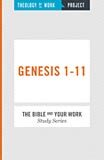The First Murder (Genesis 4:1-25)
Bible Commentary / Produced by TOW Project
Genesis 4 details the first murder when Cain kills his brother Abel in a fit of angry jealousy. Both brothers bring the fruit of their work as offerings to God. Cain is a farmer, and he brings some of the fruit of the ground, with no indication in the biblical text that this is the first or the best of his produce (Gen. 4:3). Abel is a shepherd and brings the "firstlings," the best, the “fat portions” of his flock (Gen. 4:4). Although both are producing food, they are neither working nor worshiping together. Work is no longer a place of good relationships.
God looks with favor on the offering of Abel but not on that of Cain. In this first mention of anger in the Bible, God warns Cain not to give into despair, but to master his resentment and work for a better result in the future. “If you do well, will you not be accepted?” the Lord asks him (Gen. 4:7). But Cain gives way to his anger instead and kills his brother (Gen. 4:8; cf. 1 John 3:12; Jude 11). God responds to the deed in these words:
"Listen; your brother's blood is crying out to me from the ground! And now you are cursed from the ground, which has opened its mouth to receive your brother's blood from your hand. When you till the ground, it will no longer yield to you its strength; you will be a fugitive and a wanderer on the earth." (Gen. 4:10-12)
Adam’s sin did not bring God’s curse upon people, but only upon the ground (Gen. 3:17). Cain’s sin brings the ground’s curse on Cain himself (Gen. 4:11). He can no longer till the ground, and Cain the farmer becomes a wanderer, finally settling in the land of Nod, east of Eden, where he builds the first city mentioned in the Bible (Gen. 4:16-17). (See Gen. 10-11 for more on the topic of cities.)
The remainder of chapter 4 follows Cain's descendants for seven generations to Lamech, whose tyrannical deeds make his ancestor Cain seem tame. Lamech shows us a progressive hardening in sin. First comes polygamy (Gen. 4:19), violating God's purpose in marriage in Genesis 2:24 (cf. Matt. 19:5-6). Then, a vendetta that leads him to kill someone who had merely struck him (Gen. 4:23-24). Yet in Lamech we also see the beginnings of civilization. Division of labor —which spelled trouble between Cain and Abel—brings a specialization here that makes certain advances possible. Some of Lamech’s sons create musical instruments and ply crafts using bronze and iron tools (Gen. 4:21-22). The ability to create music, to craft the instruments for playing it, and to develop technological advances in metallurgy are all within the scope of the creators we are created to be in God's image. The arts and sciences are a worthy outworking of the creation mandate, but Lamech's crowing about his vicious deeds points to the dangers that accompany technology in a depraved culture bent on violence. The first human poet after the Fall celebrates human pride and abuse of power. Yet the harp and the flute can be redeemed and used in the praise of God (1 Sam. 16:23), as can the metallurgy that went into the construction of the Hebrew tabernacle (Exod. 35:4-19, 30-35).
As people multiply, they diverge. Through Seth, Adam had hope of a godly seed, which includes Enoch and Noah. But in time there arises a group of people who stray far from God’s ways.
When people began to multiply on the face of the ground, and daughters were born to them, the sons of God saw that they were fair, and they took wives for themselves of all that they chose.... The Nephilim [giants, heroes, fierce warriors—the meaning is unclear] were on the earth in those days—and also afterward—when the sons of God went in to the daughters of humans, who bore children to them. These were the heroes that were of old, warriors of renown. The Lord saw that the wickedness of humankind was great in the earth, and that every inclination of the thoughts of their hearts was only evil continually. (Gen. 6:1-5)
What could the godly line of Seth—narrowed eventually to only Noah and his family—do against a culture so depraved that God would eventually decide to destroy it utterly?
A major workplace issue for many Christians today is how to observe the principles that we believe reflect God's will and purposes for us as his image-bearers or representatives. How can we do this in cases where our work puts us under pressure toward dishonesty, disloyalty, low-quality workmanship, unlivable wages and working conditions, exploitation of vulnerable co-workers, customers, suppliers, or the community at large? We know from Seth’s example—and many others in Scripture—that there is room in the world for people to work according to God’s design and mandate.
When others may fall into fear, uncertainty, and doubt, or succumb to unbounded desire for power, wealth, or human recognition, God’s people can remain steadfast in ethical, purposeful, compassionate work because we trust God to bring us through the hardships that may prove too much to master without God’s grace. When people are abused or harmed by greed, injustice, hatred, or neglect, we can stand up for them, work justice, and heal hurts and divisions because we have access to Christ’s redeeming power. Christians, of all people, can afford to push back against the sin we meet at our places of work, whether it arises from others’ actions or within our own hearts. God quashed the project at Babel because “nothing that they propose to do will now be impossible for them” (Gen. 11:6), for people did not refer to our actual abilities but to our hubris. Yet by God’s grace we actually do have the power to accomplish all God has in store for us in Christ, who declares that “nothing will be impossible for you” (Matt. 17:20) and “nothing will be impossible with God” (Luke 1:37).
Do we actually work as if we believe in God’s power? Or do we fritter away God’s promises by simply trying to get by without causing any fuss?








